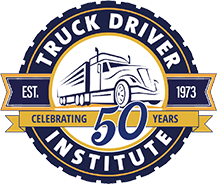What Is the Easiest State to Get a CDL?
If you’re considering getting your commercial driver’s license you may find yourself wondering, exactly what is the easiest state to get a CDL? The steps and requirements may seem endless, but really it’s not as difficult as it seems to get your CDL –no matter your current location!

What is the Easiest State to Get a CDL? Is there One?
You have to register for your commercial driver’s license in the state you live in. CDLs don’t transfer state to state as mandated by the Commercial Motor Vehicle Safety Act of 1986 which established minimum CDL requirements per state. Before 1986, drivers could receive multiple licenses in different states. Today, you must register for a license in the single state you reside in.
While you may not get to decide in which state you train and apply for your license, there are still ways to make your state the easiest state to get CDL training: with preparation and knowledge. First, get to know the federal requirements when applying for a CDL in any of the 50 states. Across the country, there’s some basic information to keep in mind:
1. Age
First, you must be at least 21 years of age to drive across state lines or haul hazardous materials. The minimum age to drive within state boundaries is determined on a state by state level, but 48 different states have their minimum age for a CDL at 18.
The two that don’t? In New York, the minimum age for a Class B CDL to operate a truck over 26,000 pounds towing less than 10k lbs or a Class C CDL to transport 16 or more passengers is 18-years-old. However, you must be 21 to receive your Class A CDL, which allows you to drive a vehicle of 26,001 pounds or more and haul a trailer that weighs 10,000 pounds or more. In Hawaii, the minimum age for any CDL license is 21.
2. Experience
Depending on the state, you must have either one or two years of driving experience, and either way, you must have a valid non-commercial driver’s license.
Accelerate Your Future
3. Citizenship
You will need to provide proof of citizenship or of lawful permanent residency. This can be done with a social security card or another document, such as a birth certificate or a green card.
4. Pass a background test and avoid disqualification
For many states, this includes having no active driver’s license suspicions or revocations. Once you receive your CDL, there are a few ways to be disqualified, including driving a commercial motor vehicle with a blood alcohol concentration of over .04%. But no matter your background, the Truck Driver Institute can help you get your CDL. In just the past few years, they’ve helped those who dealt with criminal records, DUIs, bad credit, no diploma, and more.
So, if you’re still wondering what is the easiest state to get a CDL in is, just know it includes Florida, Georgia, Alabama, Kentucky, Tennessee, Mississippi, Indiana, and South Carolina, because that’s where our schools are located.
5. Meet medical and physical requirements
The physical demands of the job can depend on what kind of driving you’re doing. But no matter the haulding specifications, a driver must be physically capable of operating a commercial motor vehicle and perform the various tasks associated with driving. This can include long periods of sitting and driving, an irregular sleep schedule, and job related stress. Some jobs will also require heavy lifting related to loading and unloading, getting in and out of the vehicle many times a day, and, depending on where you work, putting on and taking off snow tire chains (meaning southern states might be the easiest state to get a CDL depending on your physical abilities).
At minimum to obtain your CDL, you must have 20/40 vision, meaning you can read text from 40 feet away with the same accuracy as someone with 20/20 vision reading it from 20 feet away. If your uncorrected vision does not meet this, you may have to get corrective lenses to meet this standard. You must also have a field of vision at least 70 degrees in each eye and you must be able to distinguish between red, green, and yellow traffic lights.
6. Pass the written test
The written tests can come in several different forms. However, all 50 states use the same CDL manual taken from federal regulations. All questions are based on the centralized manual, so tests between states are often similar.
While it can take several tries to pass the exam at first, the Truck Driver Institute has former drivers as instructors, who are available to help you study and prepare for the written test by the end of the first week of our three week program. Once you pass, you’ll have your permit and be able to start working towards your license.
7. Hold a permit for two weeks
You must hold your permit for at least two weeks, but it is valid for six months. After that, you’ll have to retake the written exam again.
8. Pass the road test
For the road test, you will be tested on a pre-trip vehicle inspection, basic control and maneuvers, and an on-road driving test. The Truck Driver Institute prepares you for this by offering hands-on instruction. Students will be able to practice driving skills on a range and a highway, making them prepared for their test and their new careers. After all, there’s a reason 80% of TDI students are placed into driving jobs after graduation.
9. Don’t forget to renew
You will have to undergo a yearly physical to ensure you are healthy enough for the job, but the CDL license itself can be valid from five to eight years depending on the state of residence. Driving with an expired license can have serious consequences, including fines, fees, and penalties up to your license being revoked.
How to Get a CDL License without Going to School
While attending a dedicated CDL training program like the 3-week one at TDI is a common path to obtaining your license, it is possible to get a CDL without going through formal schooling; however, the process is more challenging and requires more effort from the driver than attending an accredited program would. Below is a closer look at the process of not going to CDL school, the easiest state to get CDL training, its challenges, and why attending TDI is actually your best bet for a successful truck driving career.
Self-Study for the Written Exam
The first step toward a CDL is to pass the written knowledge test. While resources like the CDL manual are readily available online, the challenge lies in studying and understanding the regulations, safety protocols, and operational procedures without the guidance of seasoned instructors. Timing for this phase can vary depending on your commitment and comprehension. However, at TDI, our instructors work with you during your first week to ensure you understand the material and can move on to the next step of the training seamlessly.
Securing Practical Driving Experience
After passing the written test, obtaining practical driving experience is up next. Without a program like TDI, you’ll need to find a commercial vehicle to practice with and a qualified mentor to invest in your training. This is challenging, and without the proper attention, guidance, and training, your timeline toward your CDL can be delayed. At TDI, all of our instructors are former truck drivers and know the ins and outs of our trucks, so you’ll be able to obtain your driving experience efficiently and effectively.
Navigating Logistical and Regulatory Requirements
Each state has specific CDL requirements, including medical exams, background checks, and at times state-specific endorsements. Navigating these requirements can be challenging, however, at TDI we have a team of professionals to guide you through the process so your CDL and trucking career aren’t delayed or derailed by paperwork.
Why TDI Stands Out
In contrast to finding ways to get your CDL license without going to school, enroll with TDI for a program that is streamlined, efficient, and effective. Our program features:
Structured Curriculum
TDI’s program is designed to prepare you for all aspects of trucking with each week focusing on a different component so by graduation you are ready for your career.
Time Efficiency
Our three-week program is optimized for quick and strategic learning, significantly reducing the time to become test-ready compared to self-study or informal practice.
Hands-On Experience
All of our campuses feature state-of-the-art equipment to ensure you gain the necessary hands-on experience for confident and safe driving without the stress of finding resources on your own.
Support System
From paperwork to navigating requirements, TDI provides support through the entire process and even throughout your career making it smoother and less stressful.
High Success Rate
With a proven track record and an 80% job placement rate, we not only prepare you for the exam but for your future.
While it’s technically possible to obtain a CDL without going to school, the challenges and considerations can be daunting. TDI provides a streamlined process that gets you started in your career in just 15 days. When attending TDI, you are not just working toward your CDL but joining a community and paving the way to a successful career.
Can I go to CDL School in Another State?
Yes, you can attend a CDL school outside your state. However, there are a few things to consider:
Transfer of CDL Permit
Be sure to get your permit transferred to your home state for your license insurance.
State-Specific Requirements
Work with the team at TDI to ensure that all requirements for your home state are met and covered.
Transfer Process
Check with your state’s DMV to ensure you understand the process for transferring your credentials and that you meet all state-specific requirements.
To learn more about transferring CDLs to another state, check out our blog post on the topic!
Make Your State The Easiest State to Get a CDL
You can make your state the easiest state to get a CDL certification in with the proper tools and preparation, all of which is provided at the Truck Driver Institute. For more information on the easiest state to get CDL training, how to sign up for one of our many established schools, and change your life in just three weeks, call today!
Get Started
Get your Class A CDL in our friendly, supportive CDL training program. TRAIN with experienced instructors – multiple good-paying, secure job choices with benefits available for eligible graduates. EARN $700 – $1000+ / week to start as a truck driver. Get started today by filling out the form below. We look forward to hearing from you!



